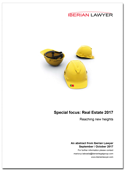Special focus: Real Estate 2017: Reaching new heights
The Iberian real estate market is attracting investors from around the world with the result that, for some law firms, deal flow is exceeding pre-crisis levels
The Spanish real estate sector is enjoying a strong recovery following the turmoil of the crisis years with investors targeting commercial real estate in prime locations, lawyers say. In addition, investors are also eyeing property in the logistics and health sectors, as well as student accommodation and residences for elderly people. Coupled with this, residential real estate assets are increasingly changing hands with the result that some real estate lawyers are now experiencing a surge of activity not seen since before the start of the crisis.
Meanwhile, in Portugal, the real estate sector is booming thanks to government initiatives such as the Golden Visa regime and new regulations that make it easier to renovate old buildings. The market is given further buoyancy by the fact that good quality real estate assets are available at reasonable prices.
Fewer NPL portfolios available
In recent years, the sale of portfolios of non-performing loans (NPLs) has been one of the most dominant features of the real estate market in Spain, and there continues to be an appetite for acquiring such loans, lawyers say. However, partners agree that the most profitable portfolios have been sold, and in general, sales of distressed loans are in decline. “There are fewer NPL portfolios, and the ones that are available are not as interesting as they used to be,” says Dentons partner Jesús Varela. “Investors believe that Spain has entered a new phase and they are now looking for commercial real estate in prime locations – such as shopping centres or hotels – if they have a longer-term strategy.” In addition to commercial real estate, Varela says residential developments are another key target for investors.
Indeed, there has been a notable revival in residential real estate transactions in recent times. “A year ago, residential real estate was anathema to investors, but there is increasing demand for these types of products,” explains DLA Piper partner Orson Alcocer. In an indication of the surge in interest in real estate in Spain, RCD – Rousaud Costas Duran recently advised property developer Elix on the creation of a €200 million Spanish real estate investment trust, known as a SOCIMI. The company, called Elix Vintage Residencial Socimi, will invest in residential real estate in Madrid and Barcelona. Alcocer says that, after a few difficult years, some law firm real estate departments are now performing even better than they were before the crisis. “We´ve exceeded pre-crisis levels in terms of deal volume and the market is expanding,” he says. Cuatrecasas partner Joaquín Garaulet agrees that market conditions have improved: “We are advising on a wide range of deals, from acquisitions to the refinancing and management of real estate assets including hotels, residential blocks, business premises and shopping centres, offices, hospitals, student housing and logistics facilities.” In June this year, Cuatrecasas advised Wanda on the €272 million sale of the the landmark Edificio España – one of the tallest buildings in Madrid – to the Baraka Group.
Alcocer says that, after a few difficult years, some law firm real estate departments are now performing even better than they were before the crisis. “We´ve exceeded pre-crisis levels in terms of deal volume and the market is expanding,” he says. Cuatrecasas partner Joaquín Garaulet agrees that market conditions have improved: “We are advising on a wide range of deals, from acquisitions to the refinancing and management of real estate assets including hotels, residential blocks, business premises and shopping centres, offices, hospitals, student housing and logistics facilities.” In June this year, Cuatrecasas advised Wanda on the €272 million sale of the the landmark Edificio España – one of the tallest buildings in Madrid – to the Baraka Group.
The increase in interest from investors is driven in part by low interest rates and the lack of alternative investments. “As long as interest rates remain low, interest in real estate will remain high,” remarks Varela. “Investors see it as a more profitable alternative to other products such as government bonds, which continue to be issued with low yields.” Consequently, market observers see the likely rise in interest rates as one of the key challenges the sector will need to overcome. Clifford Chance partner Carlos Portocarrero says: “Europe’s economy is now beginning a growth cycle, and the European Central Bank will foreseeably abandon its monetary stimulus policy – this should lead to an upward curve in interest rates over the long term, which in turn should gradually slow down rising prices.”
Shortage of high-yield products
At present, there is shortage of high-yield products in the real estate market. “Not everybody can buy the products they would like to target – there is a shortage in this respect,” Varela says. Meanwhile, Alcocer argues that investors need to “re-focus strategies and adapt to the market”. He adds: “There is a shortage of high-yield products and it´s not easy to achieve the returns that we´ve seen in the past.” Alcocer says one of the ways in which investors are adapting to the changing market circumstances is by developing properties instead of buying already-built offices or retail premises. “In order to generate profits, investors need to develop,” he explains. “Buying an asset in a desirable location is no longer enough,” he says. 
In addition to this, clients looking to tie-up deals are facing increasing competition – from Spanish and international investors – according to Garaulet. Gone are the days of purchasing real estate assets and waiting for prices to increase; meanwhile, the added pressure of growing competition means that transactions are becoming more and more sophisticated, and are also taking place more quickly, says Garaulet. He adds: “Real estate deals are increasingly complex, fast-moving and require a multidisciplinary team which is able to close them successfully.”
Portugal: ‘Trendy destination’
In recent years, the Portuguese government has taken a number of measures to boost the country’s economy and attract foreign investment. These include the Golden Visa scheme and the non-habitual residence (NHR) tax regime, as well as regulatory changes that have made it easier to refurbish old buildings that previously had limited potential for renovation due to being subject to strict lease rules. These efforts have paid off and the Portuguese real estate market is booming, according to some observers. “We went through a very harsh phase of no investment in real estate until 2014, but this is now over,” PLMJ partner Tiago Castro says. “Large investors are now coming to Portugal, and there is pressure on the market – prices are increasing and many investors are looking for opportunities. It’s like night and day when comparing then and now.” Recent Portuguese real estate deals have included Aberdeen Asset Management’s sale and leaseback of a €34.7 million portfolio of properties that are being operated by Sonae under triple net lease agreements (RRP Advogados advised Aberdeen Asset Management, while Sonae was advised by MLGTS. Meanwhile, PBBR recently advised the French group Keys Asset Management on the acquisition of Lisbon’s LX Factory, a former industrial site in Lisbon that was redeveloped and is now home to fashion, publicity, communication, fine arts, architecture and music-related businesses.
As well as incentives such as the Golden Visa and the NHR regime, the type of real estate assets available in Portugal are also proving attractive to foreign investors: “We have a good ratio of quality versus price; the Portuguese real estate market didn’t have a bubble, so foreign investors look at it with interest,” says VdA Vieira de Almeida partner Pedro Ferreirinha. Meanwhile, Uría Menéndez partner Duarte Garin highlights the fact that Portugal is “no longer under threat of intervention or an exit from the Euro, and it [Lisbon] is a European capital which offers strong yields”. He continues: “Added to regulatory improvements and VAT incentives, it makes Portugal, and Lisbon in particular, a high-demand, trendy destination.”
Gaining momentum
In this highly-competitive market, the main challenge is finding the right product to buy, and competitive bids have become the norm. Investors are targeting the full range of real estate assets, including shopping centres, hotels, business premises, offices and residential blocks. “The Portuguese property market is experiencing unparalleled momentum, with important transactions taking place across all its sectors, notably housing, tourism and retail,” remarks Cuatrecasas partner Nuno Sá Carvalho.
The Portuguese real estate market is also benefitting from political instability and uncertainty in other jurisdictions, some of which, such as Brazil, have strong historical connections with the country. “There is a new wave of Brazilian investors with the money to buy who are looking to escape political and economic pressures in Brazil,” remarks DLA Piper-ABBC partner Luís Filipe Carvalho. Indeed, investors from all around the world are now targeting the Portuguese real estate sector, according to Nuno Sá Carvalho. He adds that, due to a range of economic and political factors, Portuguese assets are in demand among different types of international investors, which include individuals, corporations, institutional investors, family offices, foreign investment funds and opportunistic investors. “They come from all over the world, including Thailand, South Africa, the US, China, Middle East, Brazil and Europe.”












